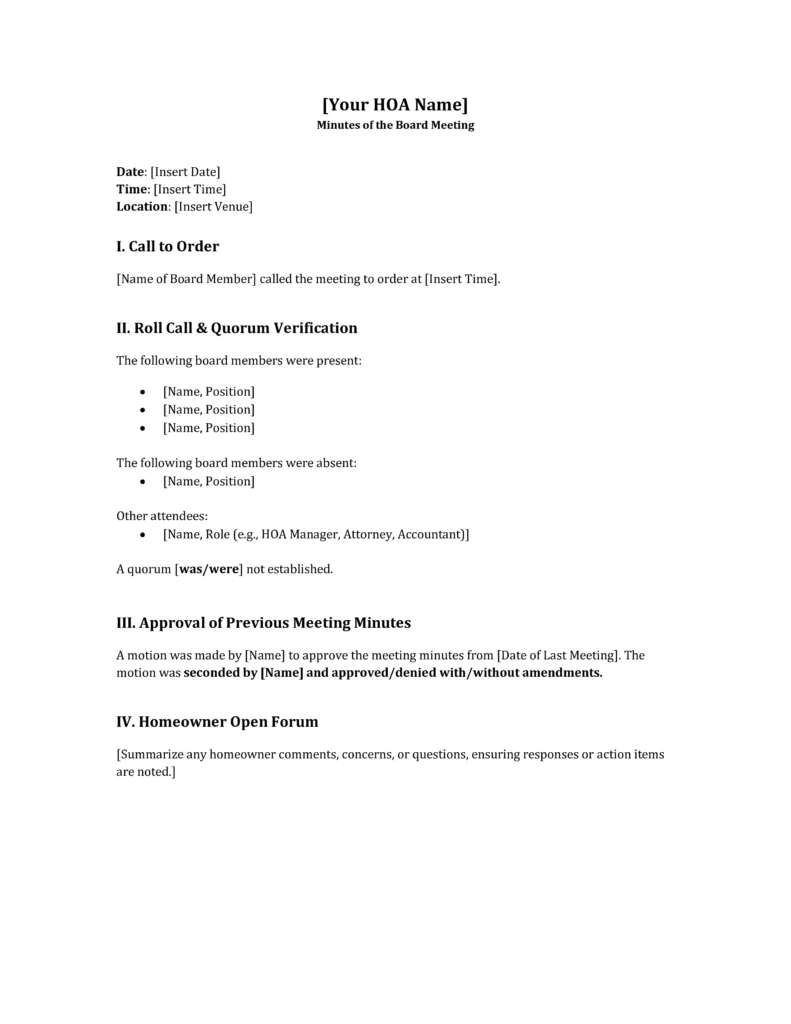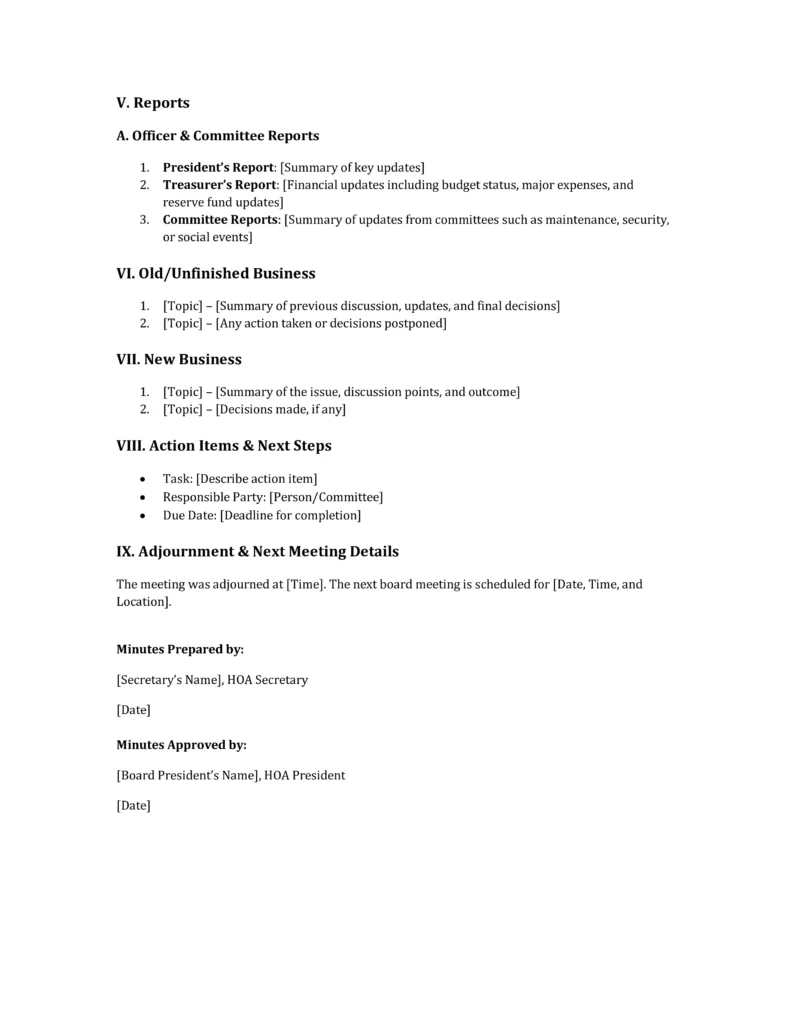HOA meeting minutes are essential for keeping homeowners associations organized, transparent, and legally compliant. They document key discussions, decisions, and financial updates, helping board members and homeowners stay accountable.
In this guide, we’ll explain what to include in HOA meeting minutes, how to format them correctly, and important legal considerations. Plus, we’ve included a free template to make the process even easier.
Table of Contents
What Are HOA Meeting Minutes?
HOA meeting minutes are official written records of discussions, decisions, and actions taken during a homeowners association’s board meetings. They serve as legal documentation to protect the HOA in case of disputes or lawsuits, provide historical records to track decisions and financial transactions over time, and ensure transparency by keeping homeowners and board members informed about the association’s operations.
While meeting minutes don’t need to capture every word spoken, they should accurately summarize key points and document any official actions taken.
What to Include in HOA Meeting Minutes
Well-organized HOA meeting minutes provide a clear and legally sound record of board decisions and discussions. To ensure accuracy and professionalism, follow this structured format:
1. Essential Meeting Details
Include the basic information about the meeting:
- Date, time, and location (especially if it changes)
- Type of meeting (regular, special, or annual)
- Names of board members present and absent
- Guests or speakers in attendance
2. Approval of Previous Minutes
Summarize the minutes from the last meeting, noting whether they were approved as written or if amendments were made.
3. Key Discussions and Agenda Items
Provide a high-level summary of each topic discussed. Focus on major updates, homeowner concerns, and board deliberations without getting lost in unnecessary details.
4. Motions, Votes, and Decisions
For each proposal:
- Record the motion maker and seconder
- Document the outcome (approved, denied, or tabled)
- Note any votes and abstentions for transparency
5. Financial Reports and Budget Updates
Outline any financial matters discussed, including:
- Budget status and major expenses
- Reserve fund updates
- Changes to dues or special assessments
- Financial reports from officers or managers
6. Action Items and Follow-Ups
Track assigned tasks and next steps:
- Who is responsible for what
- Deadlines and expected completion dates
- Committee assignments and new initiatives
7. Adjournment and Next Meeting Details
Record the exact time the meeting ended and confirm the date and time of the next meeting to keep members informed.
Well-structured HOA meeting minutes help ensure transparency, accountability, and smooth operations for your association.
How to Write HOA Meeting Minutes
Properly documenting meetings helps homeowners, board members, and future leaders stay informed and accountable. Follow these steps to create effective meeting minutes.
1. Choose the Right Format
Use clear, structured bullet points instead of long paragraphs. A standardized format ensures consistency and makes it easier to review and reference.
2. Assign a Designated Note-Taker
The HOA secretary or a designated board member should be responsible for taking minutes. Having a consistent note-taker helps maintain accuracy and completeness.
3. Use a Standard Template
A structured template simplifies the process and ensures that all necessary details, such as the meeting date, attendees, and key discussions, are consistently recorded.
4. Maintain a Neutral, Factual Tone
Meeting minutes should be objective and free from opinions or personal interpretations. Focus on capturing discussions and decisions accurately.
Example:
Correct: “The board discussed increasing HOA dues to cover rising maintenance costs.”
Incorrect: “Board members argued over unfair HOA fee increases.”
5. Summarize Key Discussions Without Unnecessary Detail
Avoid transcribing every word spoken. Instead, summarize the main points, major concerns raised, and any official actions taken. Focus on what was decided rather than individual opinions.
6. Clarify Action Items and Follow-Ups
Clearly document assigned tasks, deadlines, and responsible individuals or committees. This helps ensure accountability and progress tracking.
7. Review and Approve Minutes Before Finalizing
Before minutes are finalized, they should be reviewed for accuracy. Any necessary corrections should be noted, and the minutes should be approved at the next board meeting.
8. Ensure Legal Compliance and Secure Storage
Keep minutes concise but complete, avoiding unnecessary details that could be misinterpreted. Follow state-mandated retention policies, store records securely, and restrict access to authorized individuals.
A well-organized and properly documented set of HOA meeting minutes helps maintain transparency, ensures legal compliance, and serves as a reliable reference for future decisions.
Legal Requirements & Compliance
Laws regarding HOA meeting minutes vary by state, but most associations must follow:
1. State and Federal Regulations
- Some states require HOAs to make meeting minutes available to homeowners upon request.
- Certain nonprofit laws may apply to HOAs, impacting how minutes are recorded and stored.
For example, Washington State law on HOA meetings outlines specific requirements for record-keeping, accessibility, and disclosure of meeting minutes.
2. HOA Document Retention Rules
Many states require meeting minutes to be kept for at least seven years. Storing them securely in digital format or printed copies helps protect important records from loss or unauthorized access.
Using a reliable document storage solution like BaseHOA ensures easy retrieval and compliance with retention policies.
3. Who Can Access HOA Meeting Minutes?
- Board Members – Always have full access.
- Homeowners – May request access in some states but typically only for open meetings.
- Third Parties – Access is usually restricted unless required by law.
HOAs should review their governing documents and state laws to ensure compliance with retention and disclosure policies.
Common Mistakes to Avoid When Writing HOA Meeting Minutes
Avoiding these mistakes helps ensure that HOA meeting minutes remain professional, legally compliant, and useful for future reference.
1. Overcomplicating the Minutes
Keep sentences clear and concise. Avoid unnecessary details that do not contribute to the official record. The goal is to document key decisions and actions, not to transcribe every discussion.
2. Including Personal Opinions or Bias
Minutes should be factual and neutral. Do not include personal opinions, emotions, or subjective statements. Focus on documenting what was decided rather than the debates or disagreements leading up to it.
3. Failing to Document Motions Correctly
Always record who introduced a motion, who seconded it, and the final voting outcome. Incomplete or unclear records can create disputes and potential legal issues down the line.
HOA Meeting Minutes Template
To simplify the process, here’s a free HOA meeting minutes template you can download and use for your association.


Download your Free HOA Meeting Minutes Template Here
FAQs
How detailed should HOA meeting minutes be?
Minutes should be concise but complete, recording key decisions, financial updates, and actions taken without unnecessary details.
Do HOA minutes need to be approved?
Yes, HOA minutes must be approved at the following meeting to ensure accuracy and legitimacy.
Who can access HOA meeting minutes?
Access depends on state laws and HOA bylaws. Generally, board members have full access, and homeowners may request copies of open meeting minutes.
Who can take HOA minutes if the secretary is gone?
If the secretary is absent, another board member or a designated recorder, such as the HOA manager, can take the minutes.
Simplify HOA Meeting Minutes with BaseHOA
Accurate and well-structured HOA meeting minutes are very important for maintaining transparency, legal compliance, and effective record-keeping. By following best practices, you can create professional, easy-to-reference minutes that serve your association well.
To make the process even easier, try BaseHOA, a powerful HOA management platform that streamlines meeting documentation, securely stores records, and ensures compliance with state regulations. With BaseHOA, your board can save time, stay organized, and focus on making better decisions for your community.
Start your free trial today and see how BaseHOA can simplify your HOA management.


